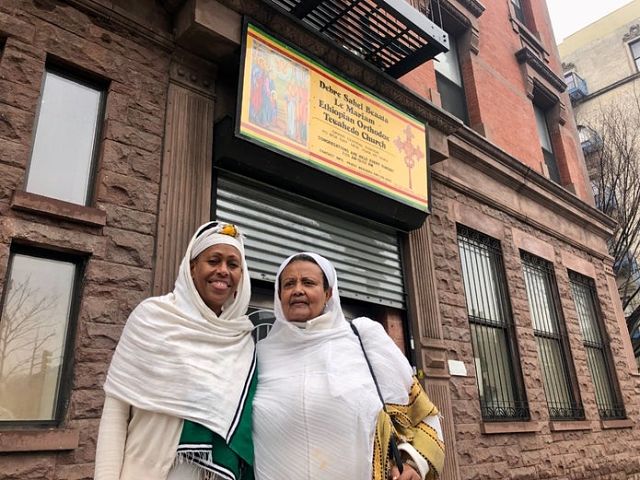 Board members Atsede Elegba (left) and Almaz Kebede outside the Beaata Le Mariam Ethiopian Orthodox Church on March 28, 2021. The church is set to be evicted from its home on Adam Clayton Powell, Jr. due to a city deal with a local nonprofit. (Photo: Patch)
Board members Atsede Elegba (left) and Almaz Kebede outside the Beaata Le Mariam Ethiopian Orthodox Church on March 28, 2021. The church is set to be evicted from its home on Adam Clayton Powell, Jr. due to a city deal with a local nonprofit. (Photo: Patch)
A celebrated deal to create permanently affordable housing in Harlem will leave the neighborhood’s last Ethiopian Orthodox church homeless.
HARLEM, NY — When leaders of the Beaata Le Mariam Ethiopian Orthodox Tewahedo Church received an eviction notice in 2019, displacing them from their longtime home, they assumed their landlord had reached a deal with some private developer to construct a new set of condominiums or a luxury tower.
“We thought it was some huge corporate structure who was just wanting to buy the building to make money,” said Atsede Elegba, a church board member.
It was not until March of this year that the church learned the more complicated truth: their landlord, the city’s Housing Preservation Department, had reached a much-heralded deal to give their building to a neighborhood nonprofit, which will convert it into permanently affordable housing.
Now, members of the church — the last remaining Ethiopian Orthodox institution in Harlem — are packing up icons and incense at their home on Adam Clayton Powell, Jr. Boulevard and West 121st Street ahead of their May 28 eviction date.
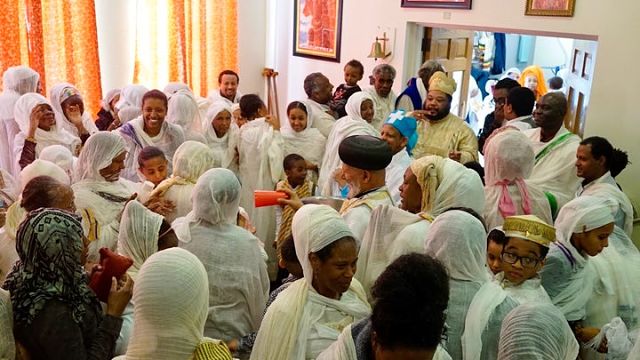
In this pre-pandemic photo, crowds gathered inside Beaata Le Mariam for a bishop’s visit in 2019. (Courtesy of Atsede Elegba)
They are also contending with internal disagreements over how to find a new home, and conflicted feelings about the group that is displacing them.
“I’m very sad,” said Mezgebu Zikarge, the church’s head priest and administrator. “I cry to God.”
“People from all over”
Behind Beaata Le Mariam’s modest corner storefront, about two dozen people were gathered on a recent Sunday after finishing that day’s services. Families sipped coffee and tea and tore off chunks of dabo bread; women wearing traditional netela scarves spoke in English and Amharic as children ran between rooms.
In the inner sanctuary, Zikarge pointed at portraits of Saint Michael, Saint Gabriel and Jesus’s crucifixion as the smell of incense wafted in. The church, which welcomed up to 100 congregants on past Sundays, has continued holding smaller, socially-distanced services during the pandemic.
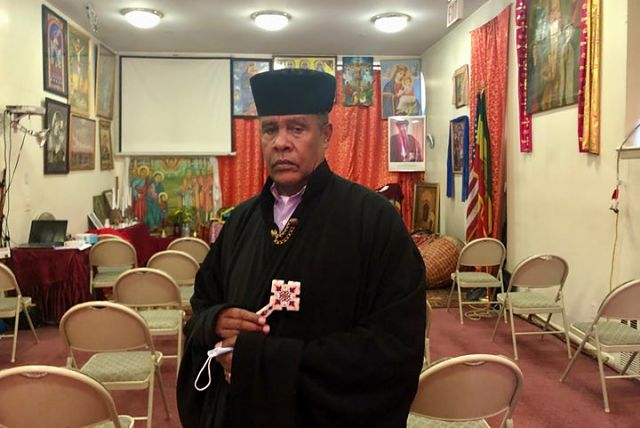
Mezgebu Zikarge, priest head and administrator of Beaata Le Mariam Ethiopian Orthodox Tewahedo Church, inside the church sanctuary on March 28, 2021. (Nick Garber/Patch)
The Ethiopian Orthodox church first made inroads in Harlem in the 1950s, arriving at the request of Black Americans who were drawn to it as one of the few Christian churches in Africa that predated colonialism.
Today, Beaata Le Mariam is “a rare combination of Western-born and Ethiopian-born parishioners,” said Elegba, whose family were early converts to the faith in the 1960s. Starting in the 1970s, Black American and Caribbean congregants were joined by native Ethiopians and Eritreans immigrating to Harlem during those countries’ civil war.
Over the years, fellow churches around Harlem have shut their doors as parishioners moved to other boroughs and the suburbs. Beaata Le Mariam opened in 2003 in Lower Manhattan, sharing space with an Armenian orthodox church before moving into its Harlem home in 2006.
“We have a lot of people from all over,” said board chair Almaz Kebede, citing congregants who travel from the Bronx, New Jersey and Connecticut to attend weekly services.
A historic housing deal
For more than a decade, Beaata Le Mariam paid just $1,267 per month to occupy the ground floor of the five-story brick building at 2020 Adam Clayton Powell, Jr. Boulevard.
Despite repeatedly asking for a permanent lease, the church was kept on a month-to-month basis by HPD, which the agency says is standard practice as it works to convert its properties into affordable housing.
Then, in April 2019, came the eviction notice.
Since December 2019, the church has been allowed to pay no rent, and was granted an extension on its eviction through June 2020 after negotiating with the city. Due to the pandemic, the deadline was extended into 2021, before the firm May 28 deadline was handed down earlier this year.
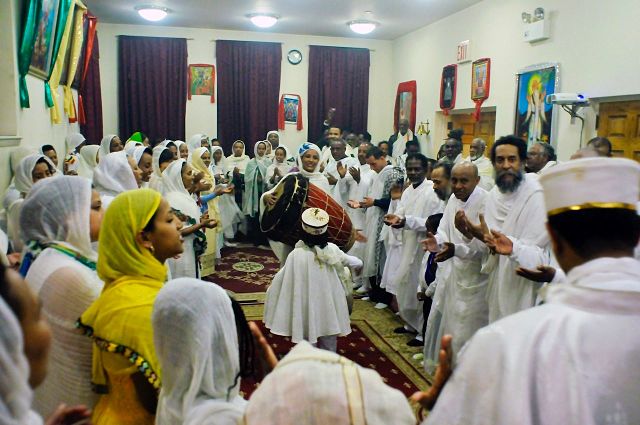
Congregants celebrated Easter inside Beaata Le Mariam in 2013. (Courtesy of Atsede Elegba)
It was only through media reports this spring that church leaders learned what had happened: their building had been transferred to the nonprofit East Harlem El Barrio Community Land Trust (EHEBCLT), in a historic agreement announced last fall and hailed by housing advocates.
In the deal, the EHEBCLT purchased four HPD-owned buildings for $1 each, promising to renovate them and turn them into housing that would be kept affordable in perpetuity.
“In anticipation of this property’s substantial renovation as part of the East Harlem El Barrio Community Land Trust (EHEBCLT) project, the former commercial tenant was issued a standard 30 day vacate notice,” HPD spokesperson Jeremy House said.
“We don’t have the money”
As the deadline nears, congregants are split roughly in half between those who want to find a way to stay, and others who see the eviction as a chance to start fresh elsewhere, Elegba said.
But as church leaders hunt for a new home in Harlem, they are facing a stark reality: few spaces are available with rents as low as what they are used to paying.
“We don’t have the money to rent a market-rate facility,” Elegba said. “It just seemed as though we were disregarded.”
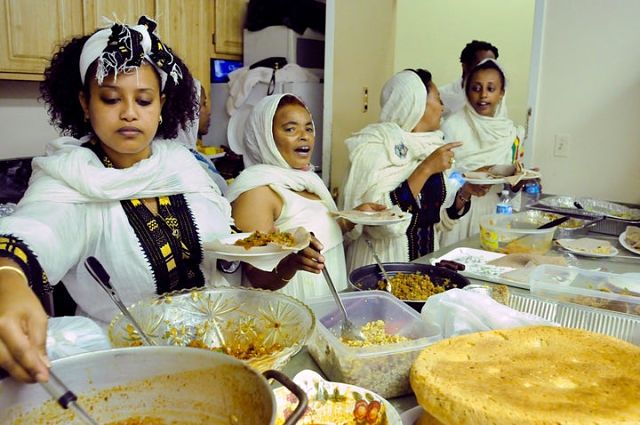
Congregants served food at Beaata Le Mariam for a 2013 celebration. (Courtesy of Atsede Elegba)
Now, elders are moving the church’s possessions into a storage locker in the Bronx, after outreach to the mayor’s faith-based pandemic advisory council and City Councilmember Bill Perkins’s office failed to yield any relief.
Reached for comment, Athena Bernkopf, a project coordinator for the EHEBCLT, said the group could not comment on legal proceedings, but has “always been open to being in conversation with community members regarding community land.”
Members of Beaata Le Mariam were hesitant to draw attention to their eviction, Elegba said, in part because they support the land trust’s mission of creating affordable housing.
But the desire to find a new home for the church outweighed their reluctance, Elegba said.
“A part of me hopes that if someone writes about it, maybe someone else will have the heart to say, ‘Maybe you can move here.”
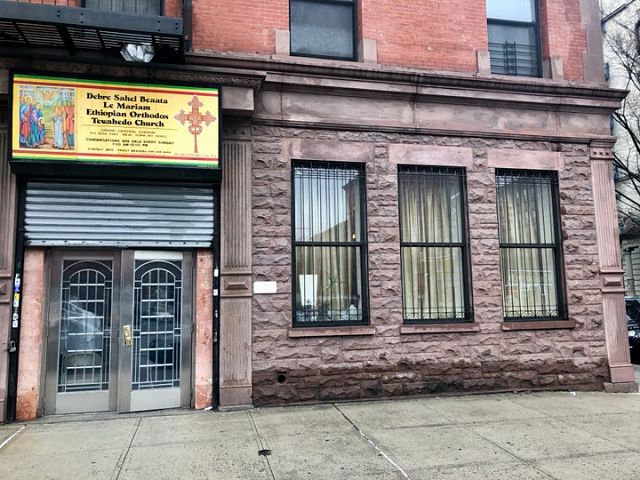
The storefront home of Beaata Le Mariam Ethiopian Orthodox Tewahedo Church, on Adam Clayton Powell, Jr. Boulevard and West 121st Street, March 28, 2021. (Nick Garber/Patch)
—
Join the conversation on Twitter and Facebook.

























